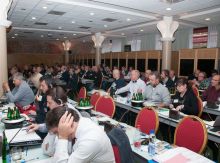Strengthening trade union networks in graphical multinationals.

Around 100 delegates from 21 trade unions, representing key multinationals in the European graphical sector, attended a conference in Budapest organised by UNI Europa Graphical and financially supported by the European Commission.
The gathering took place at a time of unparalleled austerity and pressure from employers to reduce wages and working terms and conditions. Delegates discussed the current state of play across the sector and the methods through which workers’ representatives could strengthen the role of European Works Councils to hold employers to account and influence key decisions on investment, the transfer of work, training and general employment conditions.
Participants also focussed on methods for increasing the capacity of workers’ representatives to improve communication throughout the sector, to legally enforce breaches by employers and to create overarching strategies to increase employee participation in the workplace. It was clear from the experiences among delegates that the current system of sanctions, contained in the recast Directive and available to the courts, for employers who flagrantly breach their legal obligations are still inadequate. Furthermore, employers need to begin seeing EWCs as bodies that have a positive impact on employment relations and less as an obstacle, in line with the spirit of the Directive.
The conference, organised by the European trade union federation UNI Europa Graphical and financially supported by the European Commission, provided a unique opportunity for worker representatives to discuss the extent to which employers still fail to comply with their legal obligations to inform and consult over changes at work.
Delegates expressed concern at the rapid increase in the number of mergers and acquisitions in the past few years which they acknowledge is unlikely to slow down. Participants were unanimous in their opposition to attacks on workers’ rights in Greece and Spain directly as a result of action by the Troika which undermines, and runs contrary to, the provisions contained in the EWC Directive.
Conference participants unanimously agreed to continue challenging employers who fail to adhere to the law through legal action and campaigns and that:
· EWCs need to increase their efforts to ensure there is a proper and effective mechanism to link European with national systems of information and consultation.
· EWCs ought to adopt Internal Rules to regulate and improve the communication between EWC representatives and workers.
· More EWCs are created to improve the flow of information between workers’ representatives and employers, specifically highlighting the need to improve the flow of information between workers’ representatives themselves.
· Conference participants urge EWC representatives to re-examine the provisions and practices in their current EWC agreement with a view to improving these by renegotiating in line with Directive 2009/38.
· Worker representatives on EWCs must establish Work Programmes to ensure the EWC adopts a strategic and comprehensive approach to influencing decisions affecting workers in the sector.
· Delegates welcomed the role and support of the Alliance of trade unions across the sector and urge unions to strengthen this network to lend even more support to the work of EWCs and worker representatives.
· The Alliance must continue to exchange information across its membership and step up efforts to strengthen this process.
· Delegates also agreed to strengthen trade union organisation across the sector and to preserve and expand the role of collective bargaining as the sole mechanism for improving the working conditions of workers in the sector
During its last session, the conference adopted three statements which you will find attached.

